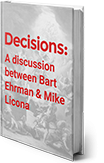Licona’s Reply to Doherty
There are those who argue that Jesus is a figment of the Church’s imagination, that there never was a Jesus at all. I have to say that I do not know any respectable critical scholar who says that any more.” Richard Burridge & Graham Gould, Jesus Now and Then, 2004, 34
Recently I wrote a review of Brian Flemming’s DVD The God Who Wasn’t There. A month or two after this review was posted, Doherty posted a rebuttal: “Responses to Critiques of the Mythicist Case—Three: Mike Licona.” Since then, I’ve been asked a few times whether I intend on replying to Doherty. Having glanced through his rebuttal for about 10-15 minutes I have only a few brief comments.
Did Jesus exist? As I mentioned toward the beginning of my Review, Paul mentions one or more of the brothers of Jesus as those he knows personally and on a number of occasions shows that he knows of the historical Jesus, knows a good number of the early traditions about him, and that there is a fair chance that Paul saw and heard Jesus. Perhaps he even met him.
In order for Doherty’s hypothesis to work, he has to present a reasonable and compelling case for why we should ignore all of these references. He has attempted to do this. But I don’t think he has made a good case for the reasons I outlined in my review—and it was by no means meant to be comprehensive. Doherty claims that the majority of scholars that I mention is “almost exclusively drawn from the ranks of the most conservative of biblical exegetes, far to the right on the critical spectrum, if indeed they lie anywhere upon it.” But notice the scholars whom Iquoted in my review: Aune, Barnett, Bornkamm, Brown, Bultmann, Burridge, Byrskog, Carrier, Charlesworth, Craig, Dunn, Ehrman, Evans, Feldman, France, Funk, Grant, Habermas, Hemer, Hendriksen, Hengel, Hurtado, Keener, Lewis, Maier, Martin, Talbert, Twelftree, Van Voorst, and Wright, most of whom can hardly be said to belong to “the ranks of the most conservative of biblical exegetes”! Mentioning what the majority of contemporary scholars hold on specific issues is not to argue that scholars are always correct. It is merely showing that nearly all of today’s scholars, including skeptical ones, hold a view that is contrary to many of the claims which Flemming and Doherty simply drop on their viewers/readers as fact, many times without supporting data or argument.
Doherty speaks of new evidence discovered since the 1970s that supports his theory, such as the Q hypothesis, the Nag Hammadi Library, and the Jewish Pseudepigrapha. But he is far too optimistic. Does he think that the Jesus Seminar Fellows who have employed these sources extensively in their writings and who are not hesitant to “rock the boat” would not be interested in becoming Jesus mythers if this is where the new data pointed?
I found the end of Doherty’s rebuttal interesting where he reports that not even The Fourth R,which is a periodical published by the Westar Institute (from which comes the Jesus Seminar), is interested in discussing his hypothesis. The editor for the periodical wrote that the question pertaining to whether Jesus really existed is not a living discussion among scholars and added, “If someone wants to doubt the existence of Jesus, my experience is that no evidence or argument will change his mind.” In spite of the $5,000 offered as an incentive to open the discussion, the request was declined. This is quite a blow to Doherty and his colleagues. It is like a guy who wants to impress his new girlfriend by cooking for her. He prepares an elaborate dinner that seems delicious to him but smells and tastes so horrible to his girlfriend that she refuses to take a bite. In frustration, he puts a little of his food on the floor for the dog, who only sniffs it then walks away.[1]
Jesus mythers are really convinced of the soundness of their position. They contend dogmatically and endlessly, using arguments and methods regarded as sound only by themselves. We spot this in Flemming’s praise for Doherty’s rebuttal to my review:
Still, it is this other side that currently has a hold, however tenuous, on the “consensus of experts” on the matter of Jesus’ historicity. It must be frustrating for Earl to have the equivalent of “the sun revolves around Earth” stand as an accepted theory while his better theory sits right out there, fully supported by evidence and logic, yet unsupported by the establishment.[2]
The editor for The Fourth R is correct in my opinion: No amount of evidence or argument will change the minds of hyperskeptics like Doherty and Flemming. My preference is to continue my research in areas that are living discussions among scholars. This requires resisting the temptation to be distracted into further discussion with Doherty, a discussion that would require much time answering a hypothesis that I and all but a very few regard as quackery. Perhaps some mythers will interpret this as backing down from what they regard as irrefutable arguments. Let them think what they may. I choose not to concern myself with the opinions of a few from this camp.
The Jesus mythers will continue to advance their thesis and complain of being kept outside of the arena of serious academic discussion. They carry their signs, “Jesus Never Existed!” “They won’t listen to me!” and label those inside the arena as “Anti-Intellectuals,” “Fundamentalists,” “Misguided Liberals,” and “Flat-Earthers.” Doherty & Associates are baffled that all but a few naïve onlookers pass them by quickly, wagging their heads and rolling their eyes. They never see that they have a fellow picketer less than a hundred yards away. It’s the president of Iran. He too is frustrated and carries a sign that says “The Holocaust Never Happened!”[3]
[1] So, that I am not misunderstood, I am not suggesting that the Fellows of the Jesus Seminar are dogs; only that these exceedingly skeptical scholars whom we might expect to embrace the Jesus myth hypothesis if there were any merit to it walk away in disinterest.
[2]Brian Flemming, “Earl Doherty does me a solid” (12/18/05) at
http://www.slumdance.com/blogs/brian_flemming/archives/001885.html.
[3] Doherty could miss my meaning here and think, “Oh, but we have so much evidence for the holocaust! We have living eyewitnesses and photographs!” But my point is that just as some deny the holocaust in spite of strong evidence, others deny the existence of Jesus in spite of strong evidence. Moreover, if a person has strong emotional reasons for denying a well-evidenced position (e.g., Doherty and Flemming have a very low opinion of Christians and the President of Iran hates Jews), it will be difficult for any amount of evidence to convince him of his error until he is able to deal with those emotions, and thereby allowing his horizon to mature.





